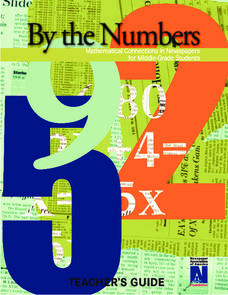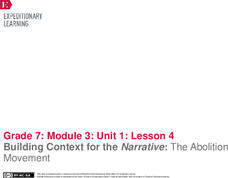State Bar of Texas
Grutter v. Bollinger
A university decides not to allow a qualified scholar to enter its institution based on skin and gender—but this case is about a white female? The 2003 Supreme Court case Grutter v. Bollinger lays the foundation for open discussion and...
Center for Civic Education
Orb and Effy Learn About Authority
Simplify the teaching of the US Constitution with this primary grade social studies lesson. While reading a fun story about an imaginary place called Bubble Land, children learn about the concept of authority and the importance of rules...
Pacific University Oregon
Civil Rights: US History
To gain an understanding of the Civil Rights Movement of the 1960s, class members investigate the Jim Crow Laws, the Emancipation Proclamation, the 13th, 14th, and 15th Amendments of the US Constitution, and the 1898 Supreme Court case,...
Achieve The Core
Linda R. Monk, Words We Live By: Your Annotated Guide to the Constitution - Grade 8
“We the people . . .” Thus begins the Preamble to the Constitution. Using a close reading approach, class members examine an excerpt from Linda Monk’s article that traces how the interpretation of these words has evolved. Some of your...
PBS
Booker T. Washington: Orator, Teacher, and Advisor
Imagine teaching yourself to read and write—do you think you could do it? Scholars analyze how Booker T. Washington went from a slave learning to read to a leading educator in the United States. Using video clips, speeches, and primary...
DocsTeach
Women of Color and the Fight for Women's Suffrage
Introduce young historians to primary source analysis with a lesson that teaches them how to use a four-step process to analyze a photograph of a 1913 Suffrage Parade. Groups practice the process and share their observations with the...
State Bar of Texas
Texas v. Johnson
If you saw a person burning an American flag, how would you feel? Scholars analyze the concept of freedom of expression and speech with the Supreme Court case Texas v. Johnson. A short video clip creates open discussion in pairs on the...
Curated OER
Voices from Little Rock: Understanding the Civil Rights Movement through Primary Sources
As part of a study of the Civil Rights Movement, class members examine documents associated with the Little Rock Nine, the Brown v. Board of Education ruling, the 14th and 15th Amendments to the US Constitution, and chapters from Melba...
Facing History and Ourselves
The Political Struggle, 1865-1866
Healing versus justice. The central source of tension following the United States Civil War was between the demands for healing and the demands for justice, the battle between President Andrew Johnson and Congress. A video introduces the...
Teaching Tolerance
Understanding the Prison Label
Break the chain. An engaging lesson examines why it is so hard to break free of the prison system in the US. Academics participate in a reader's theater, read primary sources, and discuss their thoughts. The lesson explains the hardships...
PBS
Constitution Day
Travel back to 1787 as young scholars investigate the creation of the US Constitution. After first working in small groups to create sets of classroom rules, young scholars go on to read a summary of the Constitution and watch a short...
EngageNY
End of Unit Assessment: Making Connections between Song Lyrics and Texts
For the end-of-unit assessment, scholars engage in small group Socratic seminars to connect the lyrics of two songs to texts they read and studied. They discuss how the songs "Ain't Gonna Let Nobody Turn Me Around" and "Lift Every Voice...
Judicial Branch of California
Planet Fourth Grade is Researching the U.S. Constitution
Using the Constitutional Convention as a model, learners create their own governments. Other activities to explore the American Constitution include creating posters to help explain the Bill of Rights.
Newspaper Association of America
By the Numbers: Mathematical Connections in Newspapers for Middle-Grade Students
A cross-curricular resource teaches and reinforces mathematical concepts with several activities that use parts of a newspaper. Scholars use scavenger hunts to find the different ways math is used in the paper along with using data...
EngageNY
Building Context for the Narrative: The Abolition Movement
That's history. Scholars work together to review the text Abolition and its accompanying text-dependent questions. They then determine what information to add to the Historical Context anchor chart. For homework, individuals think of...
Digital Public Library of America
The Watsons Go To Birmingham—1963 by Christopher Paul Curtis
A primary source set of photographs, videos, newspaper articles, and FBI reports provides insight into race relations during the 1960s, the Sixteenth Street Baptist Church bombing, and the murder of Emmitt Till. Designed to be used to...
Digital Public Library of America
Frederick Douglass and Abraham Lincoln
Frederic Douglass and Abraham Lincoln, although dissimilar in their backgrounds, were united in their views about slavery. A set of 14 primary sources permits scholars to examine the views of these two powerful men.
Center for Civic Education
Constitution Day Rap
Engage your class while learning about the US Constitution with this fun primary grade social studies lesson. After viewing a picture of the US Constitution, young learners piece together a US flag using stars and stripes with facts...
State Bar of Texas
Gideon v. Wainwright
How does a trial begin without a lawyer for the defendant? The 1963 Supreme Court case Gideon v. Wainwright serves as the backdrop for the study of the rights of the accused. Scholars use a short video along with paired discussion and...
Carolina K-12
African Americans in the United States Congress During Reconstruction
The Civil Rights Act of 1866, which granted citizenship to all males in the U.S., resulted in the first African Americans to be elected to Congress. Class members research 11 of these men, the challenges they faced, and craft...
C-SPAN
Choice Board - Conversations with Suffragists
Celebrate 100 years of women's suffrage by planning a re-enactment of famous women discussing their fight. After learners view a series of interviews with famous women played by actors, including Susan B. Anthony, Sojourner Truth, and...
Center for Civic Education
What Is Authority?
Young scholars examine the concepts of power and authority as they begin learning about government in this elementary social studies lesson. Through a series of readings, discussions, and problem solving activities, children learn about...
Center for History Education
Women's Rights in the American Century
Today, many young people find it hard to understand why it took over 150 years for women in the United States to get the right to vote—why there was even a need for the suffrage movement. As they read a series of primary source...
NPR
Same-Sex Marriage
The battle over same-sex marriage is a prevalent issue in the United States, and a valuable topic to be discussed in your social studies classroom. Here is a basic outline of introductory questions, focus questions, vocabulary, and media...

























